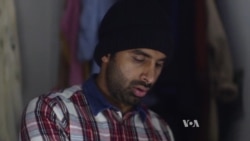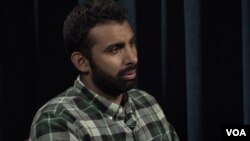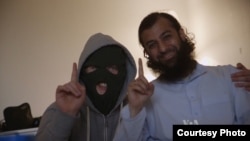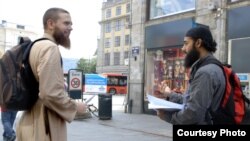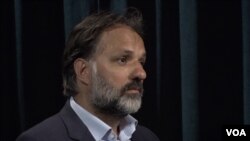Recruiting for Jihad is a Norwegian expose on the practices extremist Jihadists follow to recruit young men to fight for ISIS. During filming, Adel Khan Farooq, one of the two filmmakers, had unprecedented access to a radicalized network of Islamists in Europe. He met them through Norwegian-born Ubaydullah Hussain, a notorious recruiter, currently serving a nine-year sentence in a Norwegian prison.
"In the beginning, he was very charming," Farooq told VOA, describing Hussain. "He was easy to talk with, and I never felt like he was a threat directly against me or anybody else for that matter, but when the attacks against Charlie Hebdo in France occurred and he was praising ISIS and then praising the attacks on Copenhagen, I certainly felt like that I did not know him after all."
Still, Farooq kept filming Hussain.
"I wanted to find out why he became that way, why did he become so extreme, because there are some pieces of him that he used to be a referee in soccer and he was a bright child and did OK in school," he says. Farooq accompanied Hussain to underground meetings and workshops among radicalized Islamists in a number of places in Europe, trying to learn what was behind the radicalization of people like him.
Farooq learned that most of the radicals are born in Europe but are culturally and psychologically displaced and vulnerable to the idea of close-knit radicalized communities.
"At least in Norway, 99 percent of Muslims, the majority of Muslims, are integrated in society. They work as lawyers, doctors, teachers, police officers, and have a Muslim background. But there are some, the minority, that have these extreme views. It's not only in Norway, it's in Sweden, Denmark, UK, France, Belgium, you always find a small minority of people who don't fit in even as Muslims, they don't fit in, they are marginalized, might struggle or have some struggles at home, hard time finding work."
These types of people, Farooq says, are radicalized by leading Islamists such as Anjem Choudary, a British citizen, who supports the existence of an Islamic state.
Before his six-year incarceration for supporting Islamic State, Choudary was holding workshops throughout Europe advocating jihad. During one of those underground meetings, Farooq captured chilling footage of him preaching to a group of men, women and children in a basement room. His lecture, advocating that Islamic values are superior to British values and the British constitution, was also being recorded and distributed to thousands over the internet.
In 2015, Islamic extremists waged a series of attacks in Paris, first against the French satirical magazine Charlie Hebdo, and months later, at a concert hall and football stadium, killing 130 and injuring 368. Afterward, Farooq says Hussain told him on camera that he did not know the attackers in Paris, but he knew people who knew them.
"These extremist groups," Farooq said, "are really small, but they are strong because they work together. They either visit each other, have so called sessions, where they have seminars of sort."
Though their ideas don't represent the majority of Muslims in Europe, Farooq said, they impact the Muslim communities by fueling hatred against them.
"This radicalization is not a Muslim thing," he says. "You find radicalization in America, too. Right wing extremists, they are radicalized; criminals, they are radicalized."
One of Farooq's last filming sessions of Hussain showed the Islamist recruiting a young Norwegian to fight for ISIS in Syria. The 18-year-old recruit was apprehended at the airport just before he boarded a plane with a fake passport. Hussain was arrested, and Norwegian police forces confiscated footage from Farooq and his co-director, Ulrik Rolfsen as evidence. The filmmakers' fight for freedom of the press became a story in itself. Farooq and Rolfsen took their case all the way to Norway's Supreme Court. They won.
"The key issue is that for any democracy, it is very, very vital that journalists and media are separated from authorities," Rolfsen stressed. "My power is to tell stories and expose things that happen in society to educate the public, and I think it's important that we don't step on each other's toes."
When asked whether such a documentary can fuel fear and mistrust against Muslims, Rolfsen said that audiences' reactions overall were positive, but he admitted it is a tough subject to tackle.
"We have a lot of people hating Islam, we have a lot of people pro Islam, the whole refugee situation is in the middle of that. Publishing the film felt like walking through a fire with a big balloon filled with gasoline and you know it's going to blow up in your face if you don't hold it high enough and you don't walk fast enough."
Farooq, raised as a Muslim, feels the film was close to his heart because he wanted to expose how these cells operate on the fringes of society.
"That was very important to me and Ulrik. Because most Muslims are not like these guys," he said. "They are normal people."




